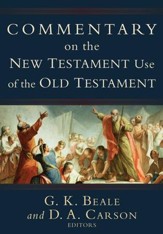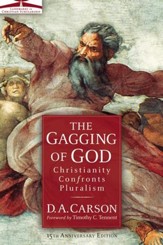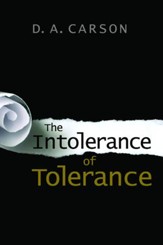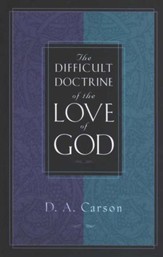
Quotes by D.A. Carson
The heart of true [Christian] fellowship is self-sacrificing conformity to a shared vision, [namely] to the gospel.
Our responsibility to love our enemies is grounded in the fact that God providentially loves the just and the unjust.
Love and the Commandment of God by D.A. Carson taken from Love in the Hard Places by D.A. Carson, 2002, Crossway Books, a division of Good News Publishers, Wheaton Illinois 60187, www.crosswaybooks.org. Page 15.
When persecution is not universal, sustained and determined, when the church survives, at the very least persecution helps Christians to see what their priorities are and can foster a deeply spiritual faithfulness grounded in the ever-present prospect of eternity.
Love and Enemies by D.A. Carson taken from Love in the Hard Places by D.A. Carson, 2002, Crossway Books, a division of Good News Publishers, Wheaton Illinois 60187, www.crosswaybooks.org. Page 66.
The idea is not simply that we have been forgiven, and therefore we ought to forgive, but that God Himself, in Christ has forgiven us, and therefore our debt is incalculable. No matter how much wretched evil has been done against us, it is little compared with the offense that we have thrown in the face of God. Yet God in Christ has forgiven us. If we know anything of the release of this forgiveness, if we have glimpsed anything of the magnitude of the debt we owe to God, our forgiveness of others will not seem to be such a large leap.
Love and Forgiveness by D.A. Carson taken from Love in the Hard Places by D.A. Carson, 2002, Crossway Books, a division of Good News Publishers, Wheaton Illinois 60187, www.crosswaybooks.org. Page 80-81.
The difference in result between forgiveness that responds to repentance and forgiveness independent of the repentance of the offending party is, of course, that the former pattern issues in reconciliation while the latter does not. But in both cases what is presupposed is that the believer forgives the offender. Transparently, reconciliation is a good thing if it can be achieved, but the goal of reconciliation should not become the cloak for nursing bitterness because it cannot be achieved.
Love and Forgiveness by D.A. Carson taken from Love in the Hard Places by D.A. Carson, 2002, Crossway Books, a division of Good News Publishers, Wheaton Illinois 60187, www.crosswaybooks.org. Page 82.
On the one hand, [we] are called to abandon bitterness, to be forbearing, to have a forgiving stance even where the repentance of the offending party is conspicuous by its absence; on the other hand, their God-centered passion for justice, their concerns for God’s glory, ensure that the awful odium of sin is not glossed over.
Love and Forgiveness by D.A. Carson taken from Love in the Hard Places by D.A. Carson, 2002, Crossway Books, a division of Good News Publishers, Wheaton Illinois 60187, www.crosswaybooks.org. Page 83.
Moral indignation, even moral outrage, may on occasion be proof of love – love for the victim, love for the Church of God, love for the truth, love for God and his glory. Not to be outraged may in such cases be evidence, not of gentleness and love, but of a failure of love.
Love and Forgiveness by D.A. Carson taken from Love in the Hard Places by D.A. Carson, 2002, Crossway Books, a division of Good News Publishers, Wheaton Illinois 60187, www.crosswaybooks.org. Page 85.
There is a form of “tolerance” that is highly commendable and even self-sacrificial; there is another form of “tolerance” that is merely an excuse for moral apathy or even gross wickedness – and in such cases it is no virtue.
Love and the Intoxication of the Diligent Routine by D.A. Carson taken from Love in the Hard Places by D.A. Carson, 2002, Crossway Books, a division of Good News Publishers, Wheaton Illinois 60187, www.crosswaybooks.org. Page 179.
If contemporary Christians ask themselves how much of their love reflects the love of God in its various dimensions, they should also ask themselves how much of their hatred reflects the hatred of God. Just as we can prostitute love, so we can prostitute hatred.
Love and the Intoxication of the Diligent Routine by D.A. Carson taken from Love in the Hard Places by D.A. Carson, 2002, Crossway Books, a division of Good News Publishers, Wheaton Illinois 60187, www.crosswaybooks.org. Page 182.
To love this God means, among many other things, that we will be hungry to get to know Him better; conversely, in learning His words and ways, His attributes and His glory, what He loves and what He hates, we will find that our understanding of what it means to love God, what it means to love enemies, what it means to love brothers and sisters in Christ, will all be progressively modified and enriched. Precisely because, as created, dependent, and redeemed creatures, we are called to love our Creator, our Sovereign, our Redeemer with heart and soul and strength and mind, we will be firmly led to think robustly about what He is like, how He views evil, what rights and responsibilities He gives to the state in a fallen world, His role both in making peace and in judgment, and, above all, His commitment to His own glory as God.
Love and the Intoxication of the Diligent Routine by D.A. Carson taken from Love in the Hard Places by D.A. Carson, 2002, Crossway Books, a division of Good News Publishers, Wheaton Illinois 60187, www.crosswaybooks.org. Page 187.
We are to love our neighbors as ourselves – and that standard of comparison, as ourselves, is often taken as an implicit command to love ourselves. On this view, the wording not only permits self-love but commands it; it not only sanctions self-esteem but reinforces its importance. On the face of it, however, self-love in Mark 12 is merely presupposed, not advocated. To read much of the contemporary literature, evangelical and otherwise, on self-esteem is to inhabit a domain a long way removed from the second great commandment.
Love and the Intoxication of the Diligent Routine by D.A. Carson taken from Love in the Hard Places by D.A. Carson, 2002, Crossway Books, a division of Good News Publishers, Wheaton Illinois 60187, www.crosswaybooks.org. Page 188.
I suspect that the one reason why the Bible does not foster self-love and self-esteem in the fashion of several strands of popular psychology is because God, unlike popular psychologists, is infinitely aware of the danger of fueling idolatry. The first temptation was the temptation to de-god God and turn self into god. Appeals to self-love and self-esteem, even at their best and even when well-intentioned, can never be far from that danger. Far better to seek the powerful remedies of the gospel.
Love and the Intoxication of the Diligent Routine by D.A. Carson taken from Love in the Hard Places by D.A. Carson, 2002, Crossway Books, a division of Good News Publishers, Wheaton Illinois 60187, www.crosswaybooks.org. Page 189.
If the love of Christ for the church is the standard of the husbands love for his wife, the least that this standard means is that the love must be self-sacrificial and for her good, for that is the way Christ loved the church. Always, therefore, the Christian husband must be thinking of expressing his love for his wife not only in terms of the characteristics found in 1 Corinthians 13, but with these two immensely practical tests: In what ways am I diligently seeking her good? And how is this pursuit of her good costing me something, prompting me to sacrifice something, as an expression of my love for her – in exactly the same way that the Savior sought the church’s good at the cost of His life?
Love and the Intoxication of the Diligent Routine by D.A. Carson taken from Love in the Hard Places by D.A. Carson, 2002, Crossway Books, a division of Good News Publishers, Wheaton Illinois 60187, www.crosswaybooks.org. Page 191.
It is as if the only pleasure and intimacy in this life that comes close to anticipating the pleasure and intimacy of the church and her Lord being perfectly united on the last day is the sexual union of a good marriage.
Love and the Intoxication of the Diligent Routine by D.A. Carson taken from Love in the Hard Places by D.A. Carson, 2002, Crossway Books, a division of Good News Publishers, Wheaton Illinois 60187, www.crosswaybooks.org. Page 191.
The perfection of God’s love, in perfect harmony with all of God’s other perfections, is inevitably displayed in different ways in the varied relationships He maintains. Similarly, mature Christian love should be nurtured as a reflection of the very being of God, in harmony with those other divine perfections we must emulate…and this love will be displayed in different ways in the very relationships we maintain.
Love and the Intoxication of the Diligent Routine by D.A. Carson taken from Love in the Hard Places by D.A. Carson, 2002, Crossway Books, a division of Good News Publishers, Wheaton Illinois 60187, www.crosswaybooks.org. Page 193.
If the Bible talked only about the love of God, carefully delineating different ways of speaking of that love, but never spoke of God’s hatred or His wrath, we would be dealing with quite a different God.
Love and the Intoxication of the Diligent Routine by D.A. Carson taken from Love in the Hard Places by D.A. Carson, 2002, Crossway Books, a division of Good News Publishers, Wheaton Illinois 60187, www.crosswaybooks.org. Page 182.
God is less interested in answering our questions than in other things: securing our allegiance, establishing our faith, nurturing a desire for holiness.
The place where God has supremely destroyed all human arrogance and pretension is the cross.
There has not only been an objective, public act of divine self-disclosure in the crucifixion of God’s own Son, but there must be a private work of God by His Spirit, in the mind and heart of the individual. If we should express unqualified gratitude to God for the gift of His Son, we should express no less gratitude for the gift of the Spirit who enables us to grasp the gospel of His Son…Unless the Spirit enlightens us, God’s thoughts will remain deeply alien to us.
The Cross and Christian Ministry: An Exposition of Passages from 1 Corinthians, Baker, 1993, p. 52.
The most extraordinary things about the biblical prerequisites for elders is that they are not all that extraordinary.
Quoted in: Mark Dever and Paul Alexander, The Deliberate Church, © 2005, Crossway Books, a division of Good News Publishers, Wheaton Illinois 60187, p. 149, www.crosswaybooks.org.
What is both surprising and depressing is the sheer prayerlessness that characterizes so much of the Western church. It is surprising, because it is out of step with the Bible that portrays what Christian living should be; it is depressing, because it frequently coexists with abounding Christian activity that somehow seems hollow, frivolous and superficial.
If it is hard to accept a rebuke, even a private one, it is harder still to administer one in loving humility.
In the darkest night of the soul, Christians have something to hold onto that Job never knew – we know Christ crucified. Christians have learned that when there seems to be no other evidence of God’s love, they cannot escape the cross. “He who did not spare His own Son but gave Him up for us all – how will He not also, along with Him, graciously give us all things?” (Rom. 8:32)… When we suffer there will sometimes be mystery. Will there also be faith? Yes. If our attention is focused more on the cross and on the God of the cross than on the suffering itself.
No voluntary act of spiritual discipline is ever to become an occasion for self-promotion. Otherwise, any value to the act is utterly vitiated.
There are three things that [necessitate] church discipline: 1. Major moral issues, 2. Major doctrinal issues and 3. Major lawlessness characterized by divisiveness.
The Gospel is the “good news” of what God has done in Christ. It is not your response to it.
The most fundamental reason Jesus Christ went to the cross is not His love for us (though that is true), but rather His desire to obey His Father’s will.
We do not give the subject of evil and suffering the thought it deserves until we ourselves are confronted with tragedy. If by that point our belief – not well thought out but deeply ingrained – are largely out of step with the God who has disclosed Himself in the Bible and supremely in Jesus, then the pain from the personal tragedy may be multiplied many times over as we begin to question the very foundations of our faith.
Do you really want nothing but totally effective, instantaneous justice? Then go to hell.
John’s point in 1 John 4, “God is love,” is that those who really do know God come to love that way too. Doubtless we do not do it very well, but aren’t Christians supposed to love the unlovable-even our enemies? Because the Gospel has transformed us, our love is to be self-originating, not elicited by the loveliness of the loved. For that is the way it is with God. He loves because love is one of His perfections, in perfect harmony with all His other perfections.
The Difficult Doctrine of the Love of God, Crossway, 2000, p. 63. Get this book!
The universal witness of the New Testament is that apostasy if persisted in not only damns but shows that salvation was never real in the first place. The New Testament reveals how close one may come to the kingdom – tasting, touching, perceiving, understanding. And it also shows that to come this far and reject the truth is unforgivable.
Matthew, The Expositor’s Bible Commentary, Zondervan, 1984, p. 292. Get this book!
Failure to believe stems from moral failure to recognize the truth, not from want of evidence, but from willful neglect or distortion of the evidence.
Matthew, The Expositor’s Bible Commentary, Zondervan, 1984, p. 391. Get this book!
All of us would be wiser if we would resolve never to put people down, except on our prayer lists.
A Call to Spiritual Reformation, Baker, 1992, p. 29. Get this book!
Prayer is the product of [our] passion for people… Unaffected fervency in prayer is not whipped-up emotionalism but the overflow of [our] love for brothers and sisters in Christ Jesus. That means that if we are to improve our praying, we must strengthen our loving. As we grow in disciplined, self-sacrificing love, so we will grow in intercessory prayer. Superficially fervent prayers devoid of such love are finally phony, hollow, shallow.
A Call to Spiritual Reformation, Baker, 1992, p. 85. Get this book!
As Christians grow in holy living, they sense their own inherent moral weakness and rejoice that whatever virtue they possess flourishes as the fruit of the Spirit.
The Sermon on the Mount, Baker, 1978, p. 71. Get this book!
The important thing, Jesus is saying (in Matthew 5:33-37), is to tell the truth and keep one’s pledges without insisting that a certain form of words must be used if it is to be binding. No oath is necessary for the truthful person… Their word is so reliable that nothing more than a statement is needed from them.
Matthew, The Expositor’s Bible Commentary, Zondervan, 1984, p. 124-125. Get this book!
An oath is a solemn statement (not necessarily a promise or a vow) affirmed to be true before God.
Matthew, The Expositor’s Bible Commentary, Zondervan, 1984, p. 123. Get this book!
Some people think (our Lord’s words in Matthew 5:33-37) prohibits them from taking oaths in a courtroom, or from taking an oath of allegiance. Their desire to obey God’s Word is admirable; but I submit they have really not understood it. As usual, Jesus is preaching in antithetical fashion; and it is important to discover just what He is saying before we take His statement with such insensitive absoluteness.
The Sermon on the Mount, Baker, 1978, p. 47. Get this book!
I fear that the cross, without ever being disowned, is constantly in danger of being dismissed from the central place it must enjoy, by relatively peripheral insights that take on far too much weight. Whenever the periphery is in danger of displacing the center, we are not far removed from idolatry.
The Cross and Christian Ministry: An Exposition of Passages from 1 Corinthians, Baker, 1993, p. 38.
Both God’s love and God’s wrath are ratcheted up in the move from the old covenant to the new, from the Old Testament to the New. These themes barrel along through redemptive history, unresolved, until they come to a resounding climax – in the cross.
The Difficult Doctrine of the Love of God, Crossway, 2000, p. 70. Get this book!
In the first garden “Not Your will but mine” [by Adam] changed Paradise to desert and brought man from Eden to Gethsemane. Now “Not My will but Yours” [by Jesus Christ] brings anguish to the Man who prays it but transforms the desert into the kingdom and brings man from Gethsemane to the gates of glory.
Matthew, The Expositor’s Bible Commentary, Zondervan, 1984, p. 545, www.zondervan.com. Get this book!
Jesus is hungry but feeds others; He grows weary but offers others rest; He is the King Messiah but pays tribute; He is called the devil but casts out demons; He dies the death of a sinner but comes to save His people from their sins; He is sold for thirty pieces of silver but gives His life a ransom for many; He will not turn stones to bread for Himself but gives His own body as bread for people.
Mathew, Zondervan, 1984, p. 112, www.zondervan.com. Get this book!
[Repentance] is not a merely intellectual change of mind or mere grief, still less doing penance, but a radical transformation of the entire person, a fundamental turnaround involving mind and action and including overtones of grief, which result in (spiritual) fruit.
Matthew, The Expositor’s Bible Commentary, Zondervan, 1984, p. 99. Get this book!
Wrath, unlike love, is not one of the intrinsic perfections of God. Rather, it is a function of God’s holiness against sin. Where there is no sin, there is no wrath-but there will always be love in God. Where God in His holiness confronts His image-bearers in their rebellion, there must be wrath, or God is not the jealous God He claims to be, and His holiness is impugned. The price of diluting God’s wrath is diminishing God’s holiness.
The Difficult Doctrine of the Love of God, Crossway, 2000, p. 67. Get this book!
The cliché, God hates the sin but love the sinner, is false on the face of it and should be abandoned. Fourteen times in the first fifty Psalms alone, we are told that God hates the sinner, His wrath is on the liar, and so forth. In the Bible, the wrath of God rests both on the sin (Romans 1:18ff) and on the sinner (John 3:36).
The Difficult Doctrine of the Love of God, Crossway, 2000, p. 70. Get this book!
Imagination is a God-given gift; but if it is fed dirt by the eye, it will be dirty. All sin, not least sexual sin, begins with the imagination. Therefore what feeds the imagination is of maximum importance in the pursuit of kingdom righteousness (Phil. 4:8).
Matthew, The Expositor’s Bible Commentary, Zondervan, 1984, p. 151. Get this book!
The miracles Jesus performs…do not compel faith; but those with faith will perceive their significance.
Matthew, The Expositor’s Bible Commentary, Zondervan, 1984, p. 363. www.zonderban.org. Get this book!
Christians claim to have the truth, and to follow Him who is the Truth (John 14:6). In our conversations, therefore, truth must be our watchword. How many of us stoop to telling stories with a reprehensible slant, either to make our point more emphatically or to present ourselves in a mere glamorous light than the raw facts will allow? How many of us say we will do things and instead renege on these responsibilities because it is personally inconvenient to go through with them? You who with me are teachers and preachers – how often do we fudge the evidence to make a point, or dogmatize in areas where we know nothing, in the hope that dogma will mask our ignorance? I am not speaking of the honest mistake, but of deceit.
The Sermon on the Mount, Baker, 1978, p. 48. Get this book!
We don’t drift into spiritual life; we do not drift into disciplined prayer. We do not grow in prayer unless we plan to pray. That means we must set aside time to do nothing but pray. What we actually do reflects our highest priorities. That means that we can proclaim our commitment to prayer until the cows come home, but unless we actually pray, our actions disown our words
A Call to Spiritual Reformation, Baker, 1992, p. 19. Get this book!
People do not drift toward holiness. Apart from grace-driven effort, people do not gravitate toward godliness, prayer, obedience to Scripture, faith, and delight in the Lord. We drift toward compromise and call it tolerance; we drift toward disobedience and call it freedom; we drift toward superstition and call it faith. We cherish the indiscipline of lost self-control and call it relaxation; we slouch toward prayerlessness and delude ourselves into thinking we have escaped legalism; we slide toward godlessness and convince ourselves we have been liberated.
Just as the angel’s announcement to Joseph declared Jesus’ primary purpose to be to save His people from their sins (Mt. 1:21), so the first announcement of the kingdom (delivered by John the Baptist) is associated with repentance and confession of sin (Mt. 3:6).
Matthew, The Expositor’s Bible Commentary, Zondervan, 1984, p. 99. Get this book!
All of God’s emotions, including His love in all its aspects, cannot be divorced from God’s knowledge, God’s power, God’s will. If God loves, it is because He chooses to love; if He suffers, it is because He chooses to suffer. God is impassible in the sense that He sustains no “passion,” no emotion, that makes Him vulnerable from the outside, over which He has no control, or which He has not foreseen.
The Difficult Doctrine of the Love of God, Crossway, 2000, p. 60. Get this book!
Jesus’ balance mirrored the balance of Scripture: He could simultaneously denounce the cities that did not repent and praise the God who does not reveal; for God’s sovereignty in election is not mitigated by man’s stubbornness and sin, while man’s responsibility is in no way diminished by God’s “good pleasure” that sovereignty reveals and conceals (Mt. 11:25-26).
The Gospel of Matthew, EBC, Zondervan, www.zondervan.com, 1984, p. 275. Get this book!
Biblical writers in both the OT and NT have, on the whole, fewer problems about the tension between God’s sovereignty and man’s responsibility than do many moderns. This is not because they fail to distinguish purpose and consequence, as many affirm, but because they do not see divine sovereignty and human responsibility as antitheses. In short they are compatibilists and therefore juxtapose the two themes with little self-conscious awareness of the problem (cf. Gen. 50:19-20; Jud. 14:4; Isa. 10:5-7; Hag. 1:12-14; Jn. 11:49-52).
The Gospel of Matthew, EBC, Zondervan, www.zondervan.com, 1984, p. 309. Get this book!
God’s wrath is not an implacable, blind rage. However emotional it may be, it is an entirely reasonable and willed response to offenses against His holiness. But His love…wells up amidst His perfections and is not generated by the loveliness of the loved. Thus there is nothing intrinsically impossible about wrath and love being directed toward the same individual or people at the same time. God in His perfections must be wrathful against His rebel image-breakers, for they have offended Him; God in His perfections must be loving toward His rebel image-bearers, for He is that kind of God.
The Difficult Doctrine of the Love of God, Crossway, 2000, p. 69. Get this book!
The coming of God’s reign either demands repentance or brings judgment.
Matthew, The Expositor’s Bible Commentary, Zondervan, 1984, p. 103. www.zondervan.com. Get this book!
The kingdom of heaven is worth infinitely more than the cost of discipleship, and those who know where the treasure lies joyfully abandon everything else to secure it.
Matthew, The Expositor’s Bible Commentary, Zondervan, 1984, p. 328. www.zondervan.com. Get this book!
If you keep burning the candle at both ends, sooner or later you will indulge in more and more mean cynicism – and the line between cynicism and doubt is a very thin one. Of course, different individuals require different numbers of hours of sleep: moreover, some cope with a bit of tiredness better than others. Nevertheless, if you are among those who become nasty, cynical, or even full of doubt when you are missing your sleep, you are morally obligated to try to get the sleep you need. We are whole, complicated beings; our physical existence is tied to our spiritual well-being, to our mental outlook, to our relationships with others, including our relationship with God. Sometimes the godliest thing you can do in the universe is get a good night’s sleep – not pray all night, but sleep. I’m certainly not denying that there may be a place for praying all night; I’m merely insisting that in the normal course of things, spiritual discipline obligates you get the sleep your body needs.
Taken from Scandalous: The Cross and The Resurrection of Jesus by D.A. Carson copyright 2010, Crossway Books, a division of Good News Publishers, Wheaton Illinois 60187, www.crosswaybooks.org, p. 147, Used by Permission.
In light of the fact that we must all die, the exact timing, surely, is of relatively little consequence.





